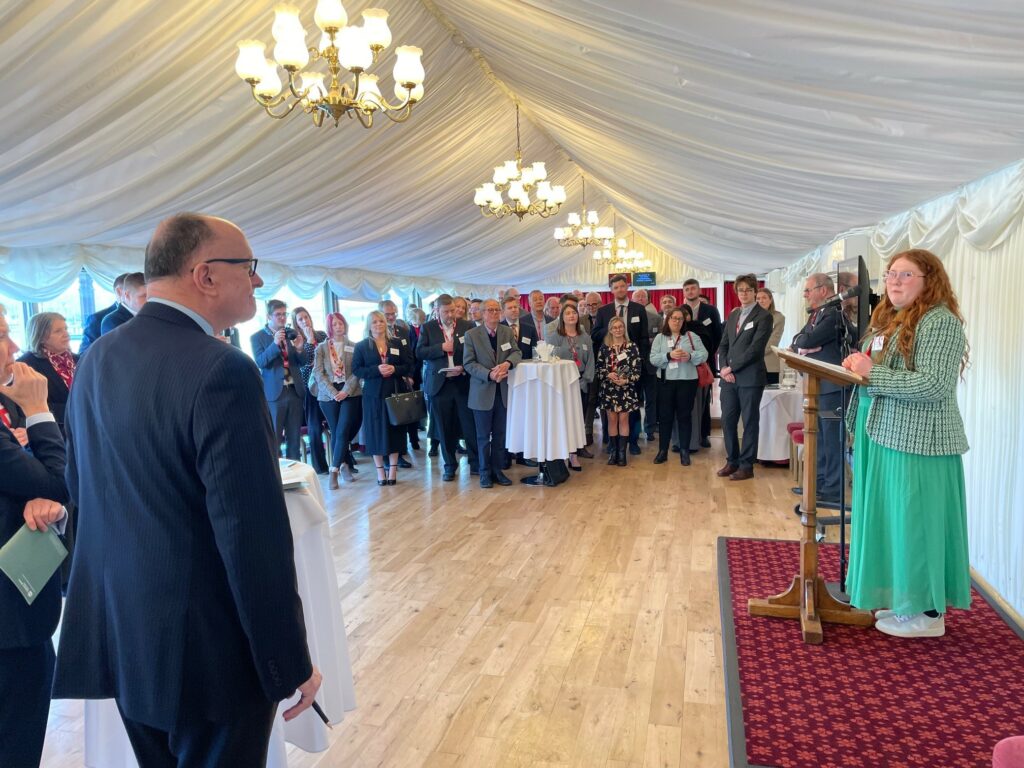University of Lincoln leads Westminster Skills and Employment Summit on GDF local opportunities
The Vice Chancellor of the University of Lincoln, Professor Neal Juster, led a parliamentary Skills and Employment Summit in the House of Lords exploring the potential opportunities that a Geological Disposal Facility (GDF) could present for Lincolnshire.
GDFs are internationally recognised by governments, technical experts, and scientists as the best solution for the safe, permanent disposal of our most hazardous radioactive waste. Nuclear Waste Services (NWS) is currently exploring suitable sites for a GDF, with one of the areas of focus located in East Lindsey, Lincolnshire.
The project, which would be one of the largest environmental protection programmes in the UK, has the potential to present the community around NWS’ chosen site with significant opportunities for a local workforce, skills, and education, as well as many other benefits such as improvements to local transport and infrastructure.
The summit saw NWS, the University and other organisations discuss the potential for local job creation and economic growth. Delegates also considered how the introduction of a major infrastructure project, such as a GDF, and its resulting supply chain would help provide aspirational opportunities for younger people, improve connectivity, and attract further investment.
The event also highlighted the recently launched independent report by the Midlands Engine Observatory: ‘A Current Socio-economic Profile of East Lindsey and an Economic Impact Assessment of a Geological Disposal Facility in East Lindsey’. The report provides a comprehensive overview of the socio-economic landscape of East Lindsey, finding that hosting a GDF in the region could provide positive benefits such as increasing employment opportunities, improving productivity, and contributing to economic diversification, growing the local economy by 4.6% by 2050.
Martin Walkingshaw, Chief Operating Officer, Nuclear Waste Services,
“With thousands of new jobs, education and training opportunities, the GDF programme has the potential to transform local communities and strengthen the UK’s energy infrastructure.
“It would provide significant, long-term opportunities for a local workforce helping to retain younger workers by offering high-skilled careers across a range of sectors, such as construction, engineering and professional services.
Over the 175 year programme a GDF could provide real longevity and sustained economic benefits, acting as a catalyst for investment which would benefit local businesses, the community and local people.
The site selection process is based on finding a willing community and suitable site, with detailed investigations carried out to ensure the chosen location meets the highest safety and security standards.
Professor Juster said:
“Rural and coastal communities, including those in Greater Lincolnshire, have major potential to contribute significantly towards the economic growth agenda. However, we know they face barriers that can stop them from doing that. This summit was a chance to discuss how we can unlock that potential through skills, education and innovation, how we can provide the opportunities for younger people, and, ultimately, drive growth across the region.”
Lord Ravensdale, Chair of Midlands Nuclear, said:
“Lincolnshire and the wider Midlands region has an opportunity to be at the forefront of the UK’s nuclear industry, and by extension the world’s. The Geological Disposal Facility is essential to ensure we can continue to invest in nuclear, supporting jobs and skills, and boosting supply chains across the country.
“By bringing together representatives from Lincolnshire and across the country, the Summit can help ensure that the nuclear industry works with Government, business and education to ensure we build capacity and capability to meet this opportunity.”

A lasting legcy
Each community participating in the GDF Siting process is already seeing significant benefits. Up to £1million a year is made available to local projects to drive positive change and leave a lasting legacy across communities. Since its formation, the Theddlethorpe GDF Community Partnership has awarded over £2 million to local community projects, including an employability programme, a befriending service and an initiative supporting people who are homeless.
The Government has also committed to providing multi-million-pound Significant Additional Investment (SAI), which will be shaped by a community vision, to the community that hosts a GDF. A vision which encourages a community to consider how a GDF could benefit them over the long-term. This investment could support the development of improved local education, improved transport networks and environmental and recreational facilities.
NWS has recently published Areas of Focus in the search to find a suitable site and a willing community to host a GDF. The areas are within the three communities currently involved in the process, in Mid Copeland and South Copeland in Cumbria, and in East Lincolnshire.
NWS will continue to work with Community Partnerships, local stakeholders and local communities engaged in the process to share information and answer questions, ensuring people have all the information they need to make an informed decision about hosting a GDF.
